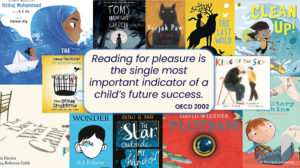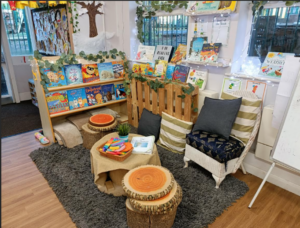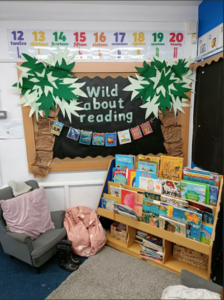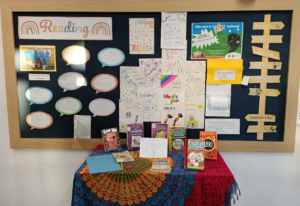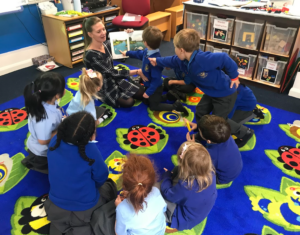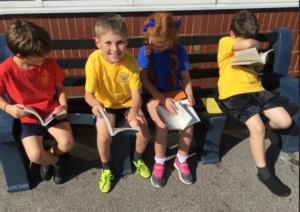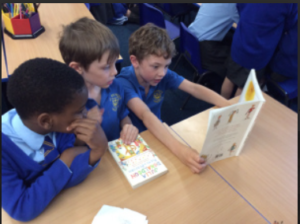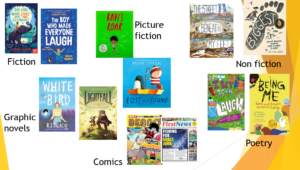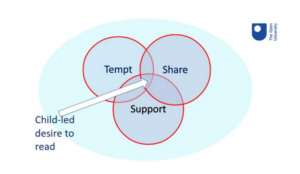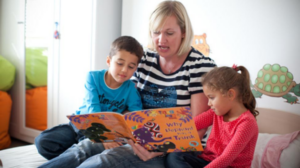Reading for Pleasure at St Wilfrid's
As a school committed to reading for pleasure we follow the RFP pedagogy and ensure that this is embedded throughout school.
RfP pedagogy:
4 Independent reading time
All staff are committed to keeping their knowledge of children’s literature current and up to date in order to ensure that they can make informed recommendations to the children in our care.
Adults in school make it a priority to get to know the preferences and reading habits of all the children in their class. We recognise the importance of inspiring all children to read through carefully sourced children’s literature e.g picture books, graphic novels, comics and newspapers and children’s novels.
How to help at home
Children need support to develop the habit and love of reading. How can you be their inspiration?
Tempt
- Talk about your interests. Find connected texts that tempt to explore and discuss together. Explore by going on a reading treasure hunt!
- Find regular opportunities to visit your local or school library.
- Recognise and celebrate diversity in texts.
- Empower your child to rad a wide range of texts - magazines, comics, graphic novels and reading that reflects different realities.
Share
- Make reading time relaxed and interactive - chat about pictures, characters, likes, dislikes and interesting facts.
- Find regular time to read aloud and share texts together.
- Invite others into the reading space - welcome siblings, grandparents and other family members to share and talk about top reads together.
Support
- Be a reading role model - share what you like to read in your own time.
- Ensure that reading and book chat are par of the everyday family routine. Thin about when and how this could best fit into your day.
- Join in with opportunities to build a home-school reading connection.
Book Chat
Research indicates that parents who regularly read with their children at home lay solid foundations for language and literacy development. It’s a precious time for you both to relax, share your thoughts and feelings, have fun and chat together.
Whilst sharing books, your child has your undivided attention, and the conversation, connection and enjoyment they experience is invaluable.
To promote children’s pleasure in reading and foster the habit, we need to read to children and with them and to talk to them about books. These conversations are crucial as they help children to engage and think deeply.
There are several ways to prompt book chat, these are our Top Tips:
 Observe and respond: Pat attention to what captures your child's attention and build on their interests, for example, 'Oh, you've spotted the...!'.
Observe and respond: Pat attention to what captures your child's attention and build on their interests, for example, 'Oh, you've spotted the...!'.
Leave Pauses: So they can look closely and think, this will lead to comments on the pictures or questions. Respond to their lead and let the book chat flow.
 Pose questions: Open questions encourage thinking and discussion, such as, 'How do you think the boy is feeling?'. Try to avoid closed questions, such as 'What colour is that?'.; these have a single answer and don't keep the conversation going.
Pose questions: Open questions encourage thinking and discussion, such as, 'How do you think the boy is feeling?'. Try to avoid closed questions, such as 'What colour is that?'.; these have a single answer and don't keep the conversation going.
Draw attention to illustrations: Encourage your child to notice details in the pictures and think what they might mean, for example, 'Look! What's that hiding, what do you think it might be?'.
 Ponder and wonder: Encourage your child to think about what might happen, using phrases such as, 'I wonder if/ whether / who / why/ what...'.
Ponder and wonder: Encourage your child to think about what might happen, using phrases such as, 'I wonder if/ whether / who / why/ what...'.
Make personal connections: Picture storybooks not only allow children to emphasise with the experiences of fictional characters but enable them to make sense of events in their owe lives. Talk about connections, for example, 'That reminds me of when...'.
 Comment on your feelings: By sharing your emotional response to a character or something that's happened you encourage your child to do the same, helping them engage and learn to express their emotions.
Comment on your feelings: By sharing your emotional response to a character or something that's happened you encourage your child to do the same, helping them engage and learn to express their emotions.
 Your combined pleasure counts: Bring the story to life with facial expression, actions and sounds, encouraging your child to join in! Do offer information to help with unfamiliar words, such as 'That's the hencoop, it's where the hens live', but keep the focus on fun.
Your combined pleasure counts: Bring the story to life with facial expression, actions and sounds, encouraging your child to join in! Do offer information to help with unfamiliar words, such as 'That's the hencoop, it's where the hens live', but keep the focus on fun.
Book Chat develops language, comprehension and pleasure. Book Chat encourages readers. Open questions, comments and prompts get the Book Chat going. Invite your child to make connections and share views. Join in with your thoughts too!
